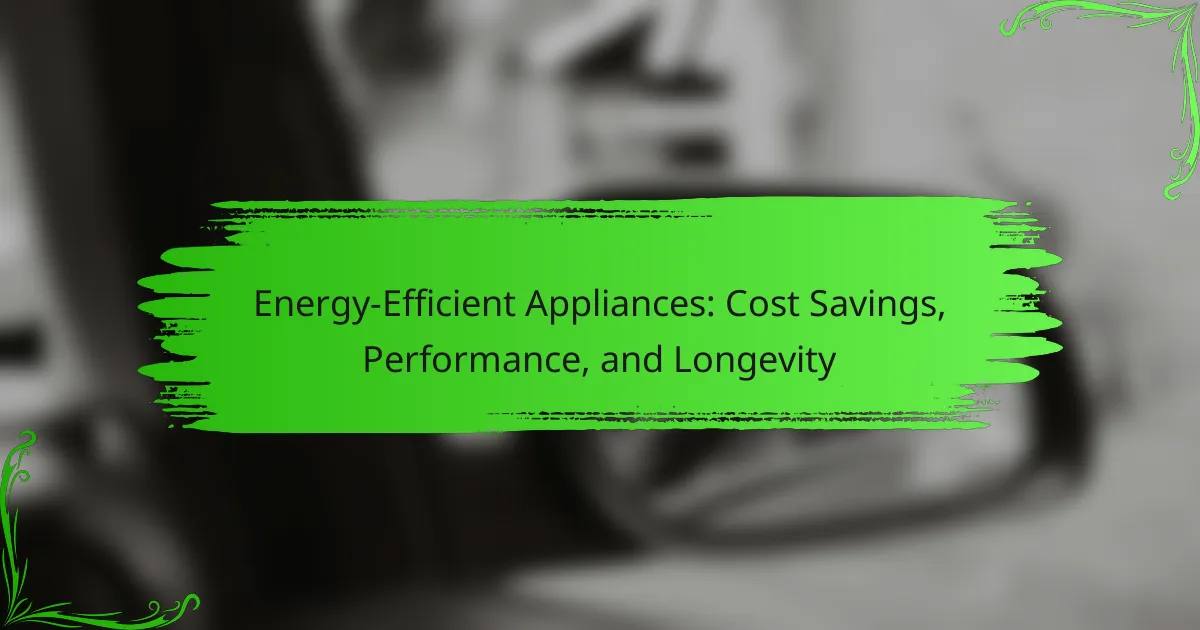Energy-efficient appliances are designed to minimize energy consumption, resulting in lower utility bills and significant cost savings over time. By utilizing advanced technology, these appliances maintain or even enhance performance while using less electricity or water. Investing in Energy Star certified products, such as refrigerators and washing machines, not only benefits your wallet but also contributes to a more sustainable environment.
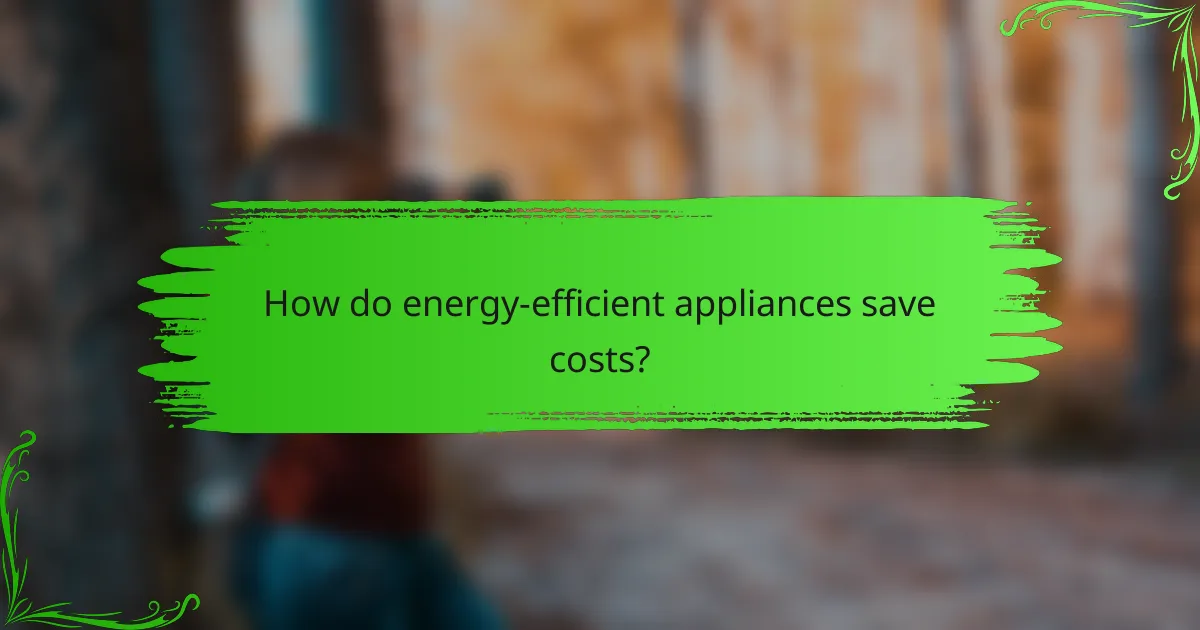
How do energy-efficient appliances save costs?
Energy-efficient appliances save costs primarily by reducing energy consumption, which leads to lower utility bills. These appliances are designed to use less electricity or water while maintaining performance, resulting in significant savings over time.
Lower utility bills
One of the most immediate benefits of energy-efficient appliances is the reduction in monthly utility bills. For example, an energy-efficient refrigerator can use up to 50% less energy than older models, translating to savings of around $100 or more annually. Over time, these savings can accumulate, making a noticeable difference in your overall expenses.
To maximize savings, consider appliances with the ENERGY STAR label, which indicates they meet strict energy efficiency guidelines set by the U.S. Environmental Protection Agency. This can ensure you are choosing products that will significantly lower your energy usage.
Rebates and tax incentives
Many governments and utility companies offer rebates and tax incentives for purchasing energy-efficient appliances. These financial incentives can help offset the initial cost of the appliance, making it more affordable. For instance, rebates can range from $50 to several hundred dollars, depending on the appliance type and local programs.
Check with your local utility provider or government website to find available programs in your area. Taking advantage of these incentives can enhance the overall savings from your energy-efficient purchase.
Long-term savings
Investing in energy-efficient appliances often leads to substantial long-term savings. While the upfront cost may be higher, the reduced energy consumption can result in savings that exceed the initial investment within a few years. For example, over a 10-year period, the savings from an energy-efficient washing machine could amount to several hundred dollars compared to a standard model.
Additionally, energy-efficient appliances tend to have longer lifespans due to their advanced technology and design, which can further enhance their value. Choosing quality appliances can lead to fewer replacements and repairs, contributing to overall cost savings.
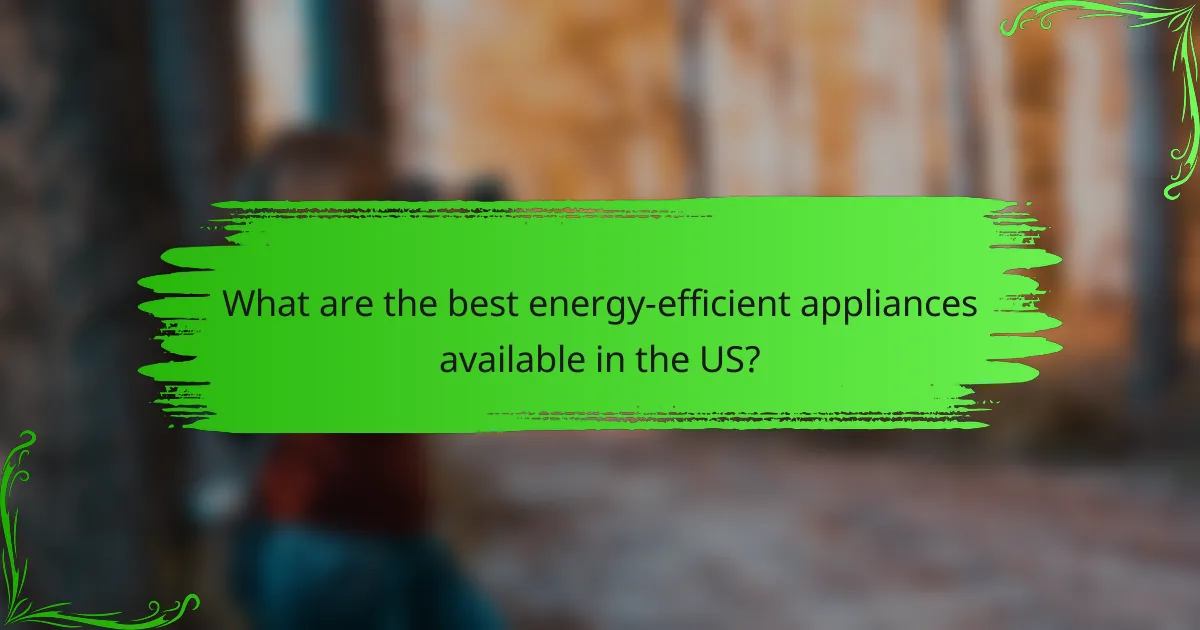
What are the best energy-efficient appliances available in the US?
The best energy-efficient appliances in the US include Energy Star certified refrigerators, high-efficiency washing machines, and smart thermostats. These appliances not only reduce energy consumption but also lead to significant cost savings over time.
Energy Star certified refrigerators
Energy Star certified refrigerators are designed to use less energy than standard models, often consuming about 15% less. When shopping, look for the Energy Star label, which indicates compliance with strict efficiency guidelines set by the EPA.
Consider features like size and style, as larger models may use more energy. However, choosing a model that fits your needs can help minimize waste and maximize savings. On average, you can expect to save around $50 to $100 annually on energy bills with these refrigerators.
High-efficiency washing machines
High-efficiency washing machines use significantly less water and energy compared to traditional units. They typically employ advanced technology to optimize water use and reduce cycle times, which can lead to savings of around 30% on water and energy costs.
When selecting a washing machine, look for front-loading models, which tend to be more efficient than top-loaders. Additionally, consider the load capacity; larger machines can handle more laundry at once, further enhancing efficiency and saving time.
Smart thermostats
Smart thermostats help manage your home’s heating and cooling systems more efficiently. By learning your schedule and preferences, they can adjust temperatures automatically, potentially reducing energy bills by 10% to 15% annually.
When choosing a smart thermostat, ensure it is compatible with your HVAC system and consider features like remote access and energy usage reports. Installing one can be a straightforward DIY project, and many utility companies offer rebates for energy-efficient upgrades, making them a cost-effective choice.
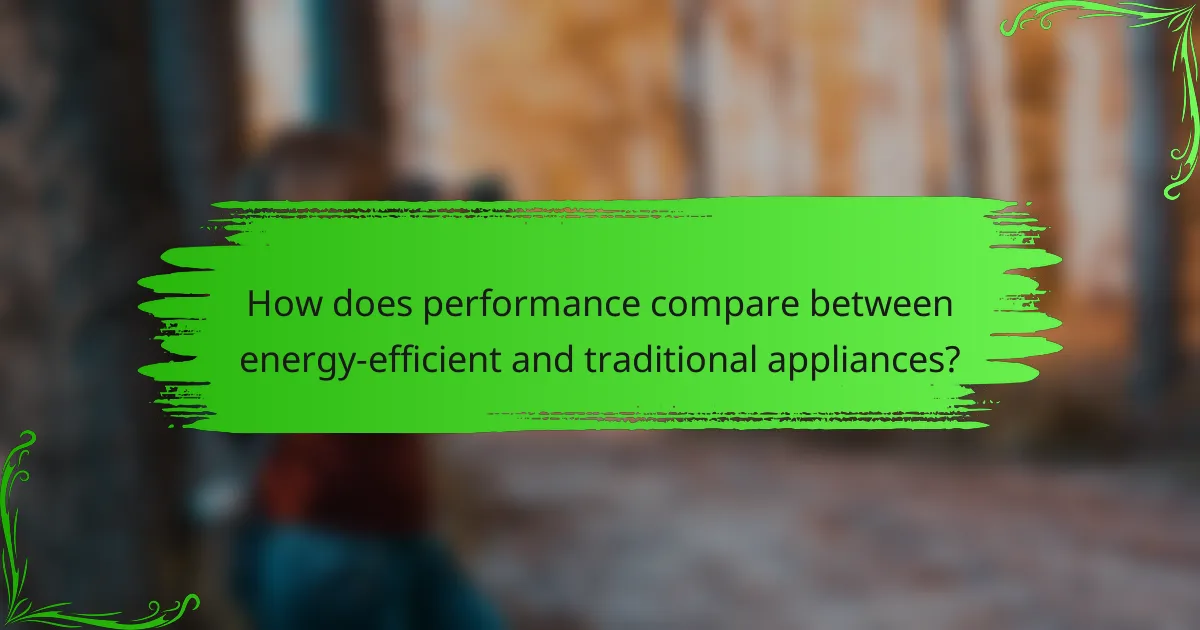
How does performance compare between energy-efficient and traditional appliances?
Energy-efficient appliances typically outperform traditional models in energy consumption while maintaining similar or superior functionality. They are designed to use less energy, which can lead to significant cost savings over time without sacrificing performance.
Energy-efficient performance metrics
Energy-efficient appliances often feature metrics such as Energy Star ratings, which indicate their efficiency compared to standard models. For instance, a washing machine with an Energy Star label may use 20-30% less energy and water than a conventional one, resulting in lower utility bills.
Additionally, these appliances may have advanced technology that optimizes performance, such as sensors that adjust energy use based on load size. This means they can provide effective cleaning or cooking while minimizing resource consumption.
Consumer satisfaction ratings
Consumer satisfaction ratings for energy-efficient appliances tend to be high, often reflecting their reliability and cost savings. Many users report that these appliances not only reduce energy bills but also perform better than expected, leading to increased overall satisfaction.
Surveys indicate that a significant percentage of consumers prefer energy-efficient models for their long-term savings and environmental benefits. When shopping, look for reviews and ratings that highlight both performance and energy efficiency to make informed choices.

What is the lifespan of energy-efficient appliances?
Energy-efficient appliances typically have a lifespan ranging from 10 to 20 years, depending on the type and brand. These appliances are designed to last longer while consuming less energy, which contributes to their overall value.
Average lifespan compared to traditional models
On average, energy-efficient appliances outlast traditional models by several years. For instance, a standard refrigerator may last around 10 to 15 years, while an energy-efficient model can extend that lifespan to 15 to 20 years. This increased longevity can lead to significant cost savings over time.
Washing machines and dishwashers also show similar trends, with energy-efficient versions often exceeding the lifespan of their conventional counterparts by a few years. This durability is a key factor in their appeal to consumers looking for long-term investments.
Factors affecting longevity
Several factors influence the lifespan of energy-efficient appliances, including usage patterns, maintenance, and environmental conditions. Regular maintenance, such as cleaning filters and checking seals, can enhance performance and extend the life of these appliances.
Additionally, the quality of the appliance itself plays a crucial role. Higher-end models often incorporate better materials and technology, which can lead to increased durability. It’s also important to consider the installation environment; appliances in humid or extreme temperature conditions may experience reduced lifespans.
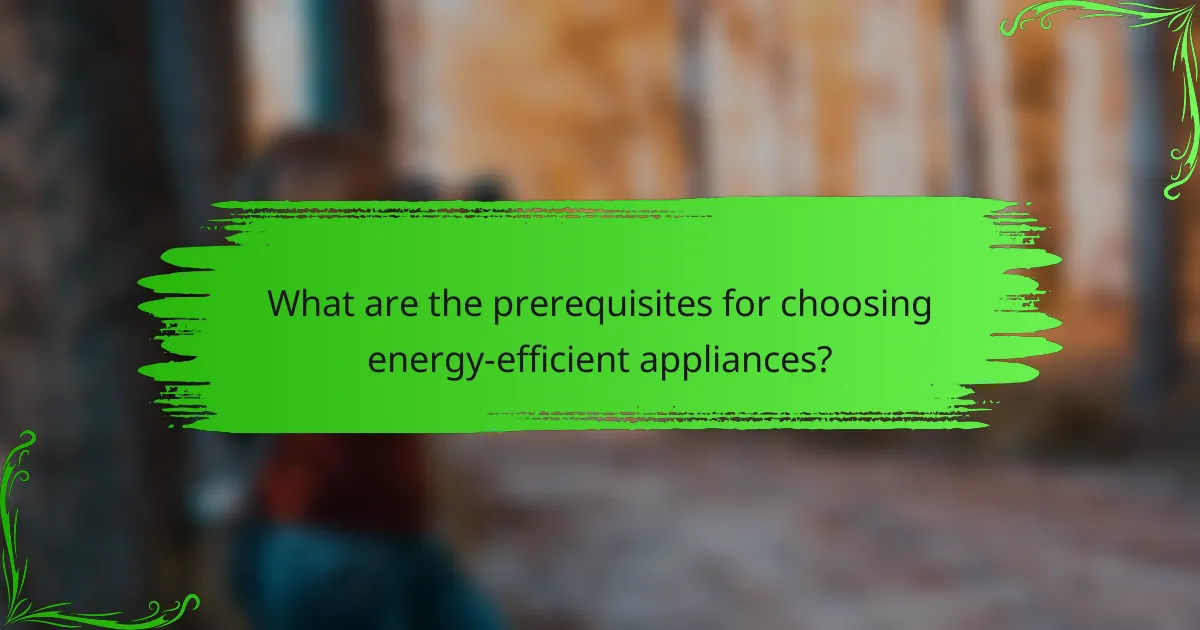
What are the prerequisites for choosing energy-efficient appliances?
Choosing energy-efficient appliances requires understanding their energy ratings, assessing your household’s energy needs, and considering the upfront costs versus long-term savings. These factors help ensure that the appliances you select will perform well and contribute to lower energy bills over time.
Understanding energy ratings
Energy ratings indicate how efficiently an appliance uses energy, typically represented by a label that includes a star rating or a letter grade. In many regions, appliances are rated on a scale from A to G, with A being the most efficient. Familiarizing yourself with these ratings can help you compare products and make informed choices.
For example, an appliance with an A+ rating may consume significantly less energy than one rated C, potentially saving you tens of dollars annually on your electricity bill. Look for appliances that meet or exceed local energy efficiency standards, such as ENERGY STAR in the United States or EU energy labels in Europe.
Assessing household energy needs
Understanding your household’s energy needs is crucial for selecting the right energy-efficient appliances. Consider factors such as the size of your home, the number of occupants, and your typical usage patterns. For instance, a larger family may require a more efficient refrigerator and washing machine to handle increased demand.
Evaluate your current energy consumption by reviewing past utility bills and identifying which appliances contribute most to your energy use. This assessment can guide you in prioritizing which appliances to replace first for maximum savings. Additionally, consider the potential for future energy needs, such as adding new appliances or expanding your household.
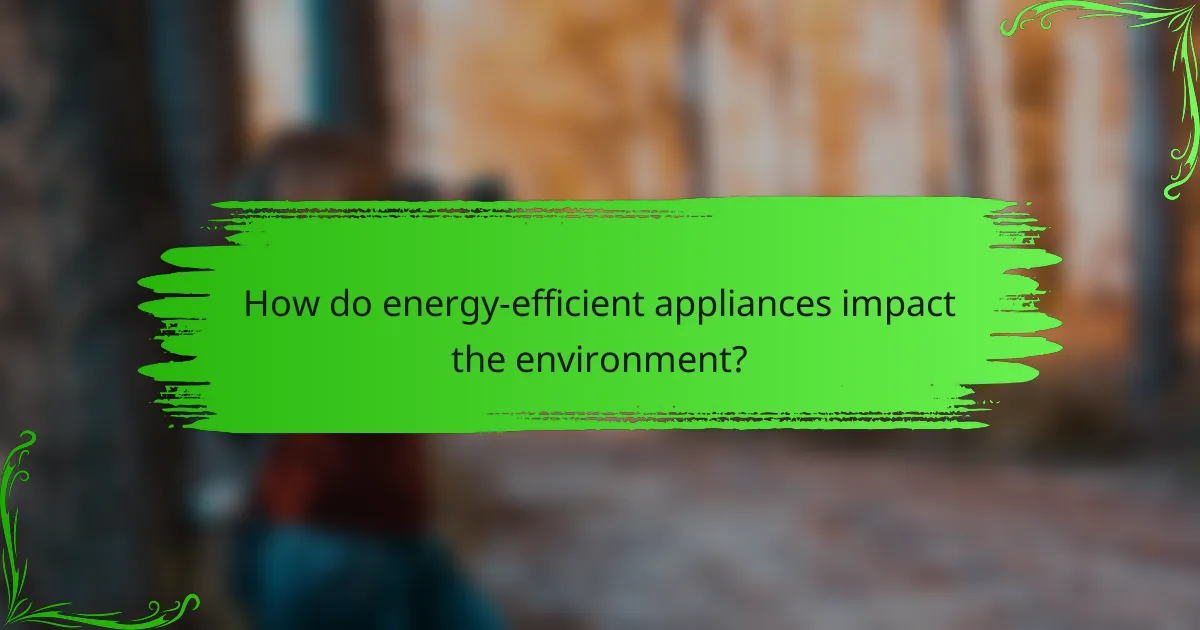
How do energy-efficient appliances impact the environment?
Energy-efficient appliances significantly reduce energy consumption, which leads to lower greenhouse gas emissions and a smaller environmental footprint. By using less electricity or gas, these appliances contribute to a healthier planet and promote sustainable living practices.
Reduction in carbon footprint
Energy-efficient appliances help lower the carbon footprint by consuming less energy, which in turn reduces the amount of fossil fuels burned for electricity generation. For instance, switching to an Energy Star-rated refrigerator can cut energy use by approximately 15-20%, translating to fewer emissions associated with power plants.
Additionally, using energy-efficient appliances can lead to substantial savings on utility bills, which encourages consumers to adopt greener habits. Over time, widespread adoption of these appliances can lead to significant reductions in overall carbon emissions at the community and national levels.
Conservation of natural resources
By using less energy, energy-efficient appliances contribute to the conservation of natural resources such as water and fossil fuels. For example, energy-efficient washing machines often use less water per load, which helps preserve this vital resource while also reducing energy needed for heating water.
Moreover, as these appliances typically have longer lifespans and require fewer replacements, they help minimize waste and the demand for raw materials. This not only conserves resources but also reduces the environmental impact associated with manufacturing and disposing of appliances.

What are the latest trends in energy-efficient appliances?
The latest trends in energy-efficient appliances focus on enhanced performance, smart technology integration, and sustainable materials. These advancements not only reduce energy consumption but also improve user convenience and appliance longevity.
Smart home integration
Smart home integration is a key trend in energy-efficient appliances, allowing users to control devices remotely and optimize energy use. Appliances like smart refrigerators and washing machines can be programmed to operate during off-peak hours, reducing electricity costs.
Many energy-efficient appliances now feature compatibility with smart home systems, enabling voice control and automation. This integration can lead to significant energy savings, as users can monitor and adjust settings in real-time.
Innovations in energy technology
Innovations in energy technology are driving the development of more efficient appliances. For instance, variable speed motors in HVAC systems and advanced heat pump technology can enhance energy efficiency by adjusting output based on demand.
Additionally, the use of smart sensors in appliances helps optimize performance by detecting usage patterns and adjusting energy consumption accordingly. These technologies not only save energy but also extend the lifespan of appliances by reducing wear and tear.
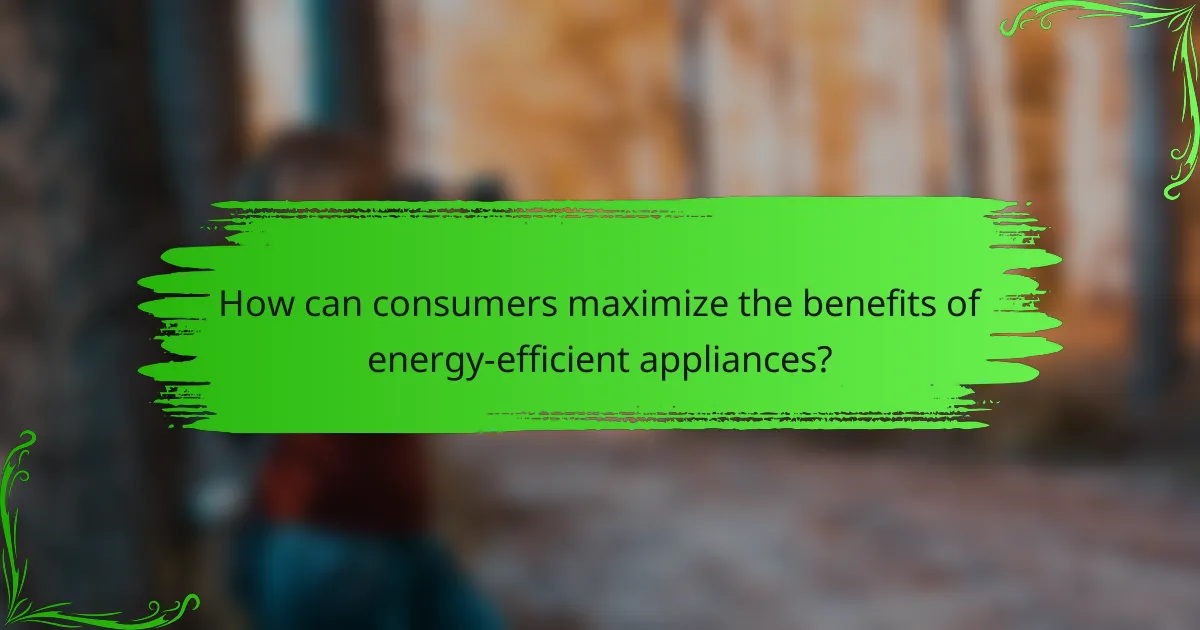
How can consumers maximize the benefits of energy-efficient appliances?
Consumers can maximize the benefits of energy-efficient appliances by selecting models that meet their specific needs while considering their energy consumption and overall cost savings. Understanding the features, maintenance requirements, and proper usage can further enhance performance and longevity.
Choosing the right appliances
Selecting the right energy-efficient appliances involves looking for models with high Energy Star ratings or equivalent certifications. These appliances typically consume less electricity or water, leading to significant savings over time. Consider your household size and usage patterns to choose appliances that match your needs without overspending on unnecessary features.
Understanding energy consumption
Understanding energy consumption is crucial for maximizing savings. Check the energy guide labels on appliances, which provide estimates of annual energy costs. Compare these figures to similar models to identify the most efficient options. Keep in mind that initial costs may be higher, but the long-term savings can offset this investment.
Proper usage and maintenance
Proper usage and maintenance of energy-efficient appliances can significantly impact their performance and lifespan. Follow manufacturer guidelines for operation and cleaning to ensure optimal efficiency. Regularly check seals on refrigerators and dishwashers, and clean filters on washing machines and dryers to maintain energy efficiency.
Long-term cost savings
Long-term cost savings from energy-efficient appliances can be substantial. While upfront costs may be higher, these appliances generally use less energy, resulting in lower utility bills. Over the lifespan of the appliance, savings can often reach hundreds of dollars, making them a wise investment for budget-conscious consumers.
